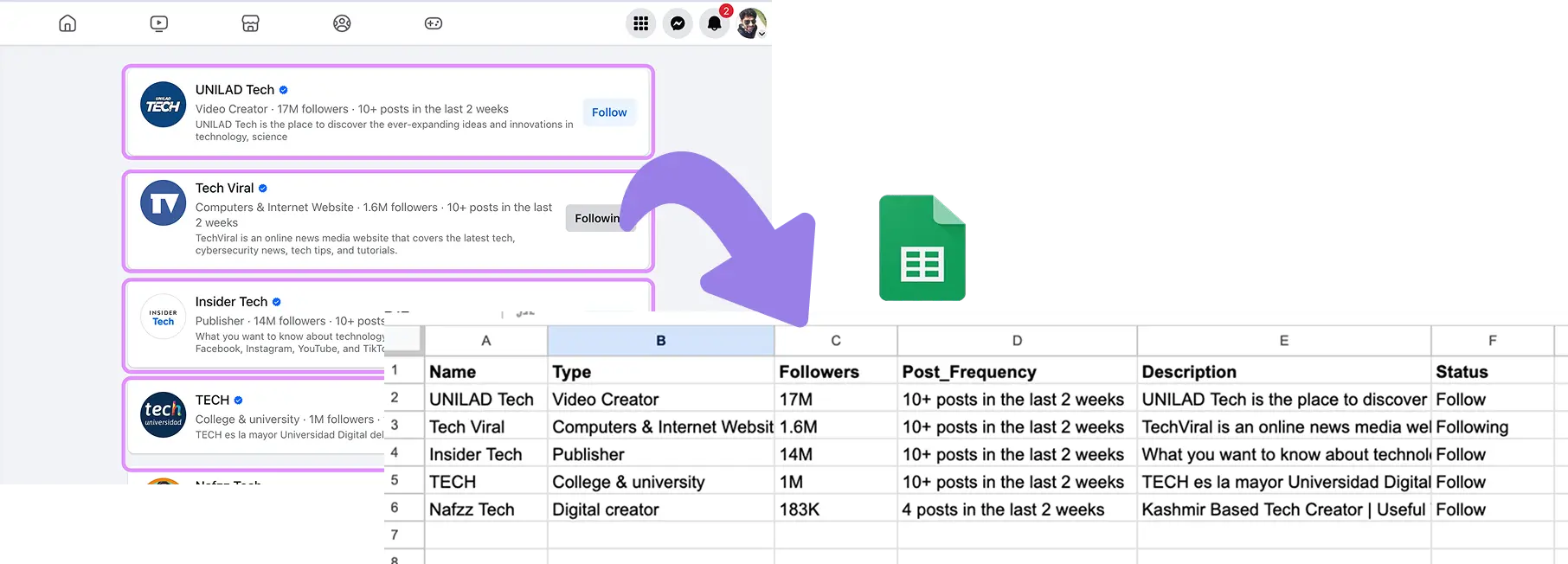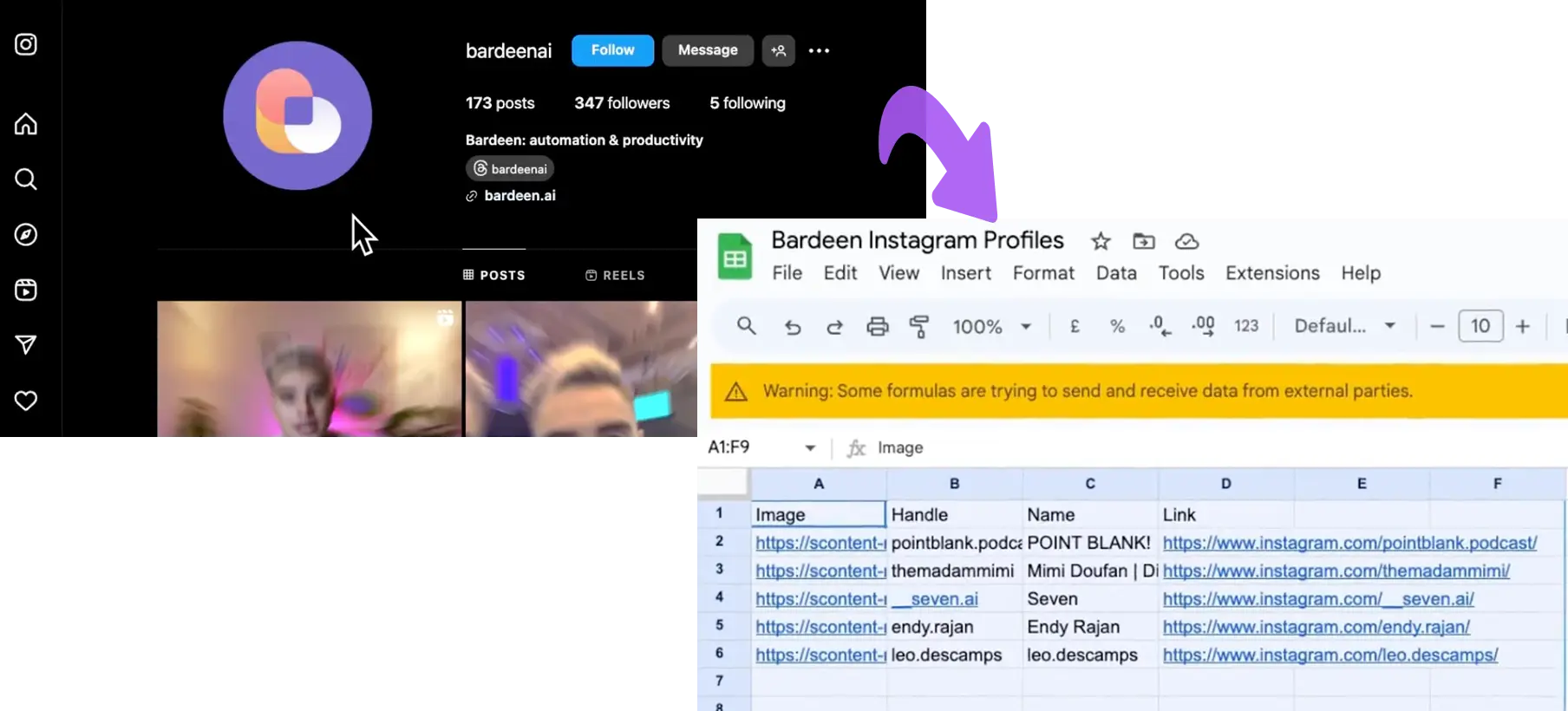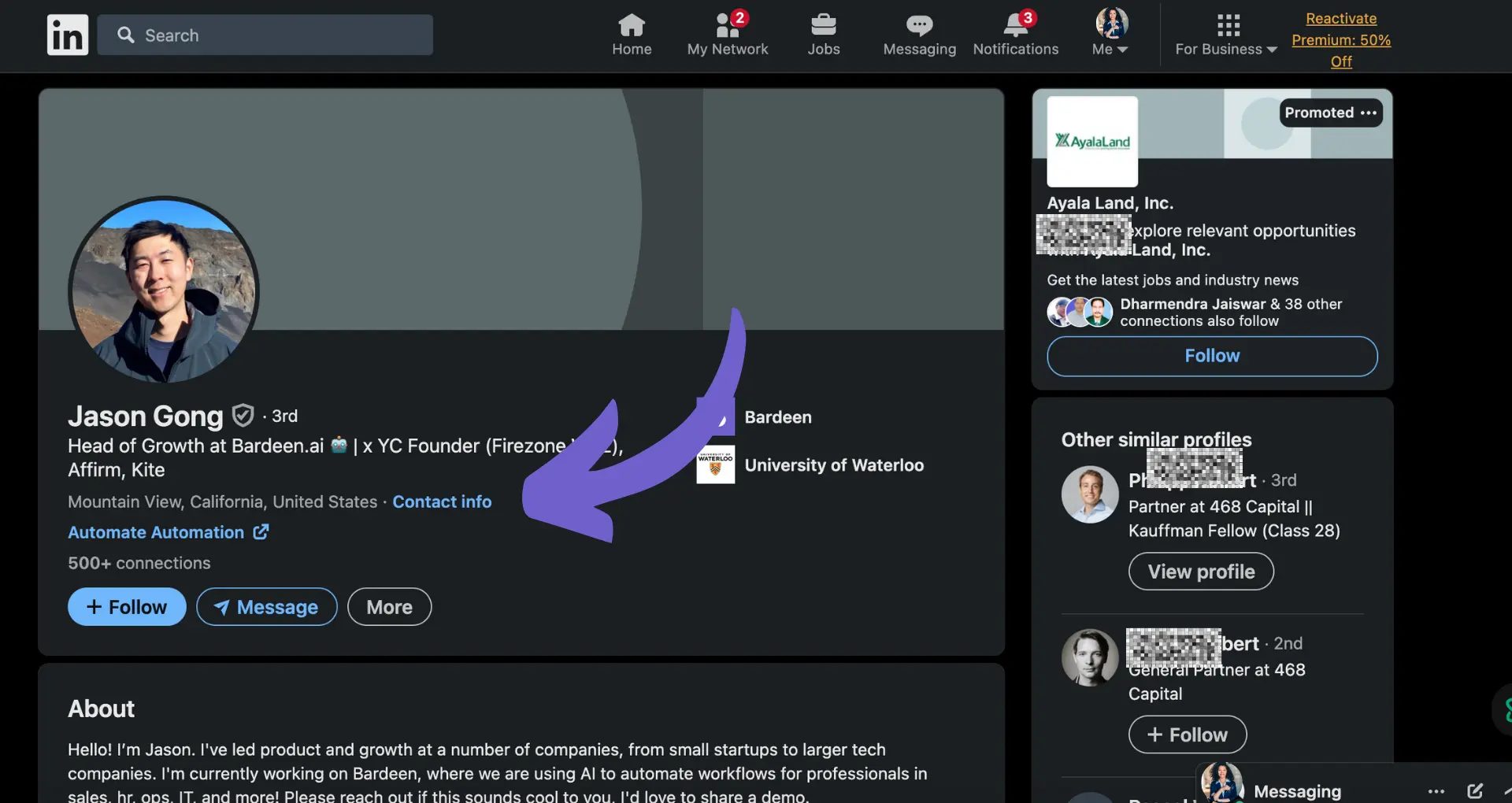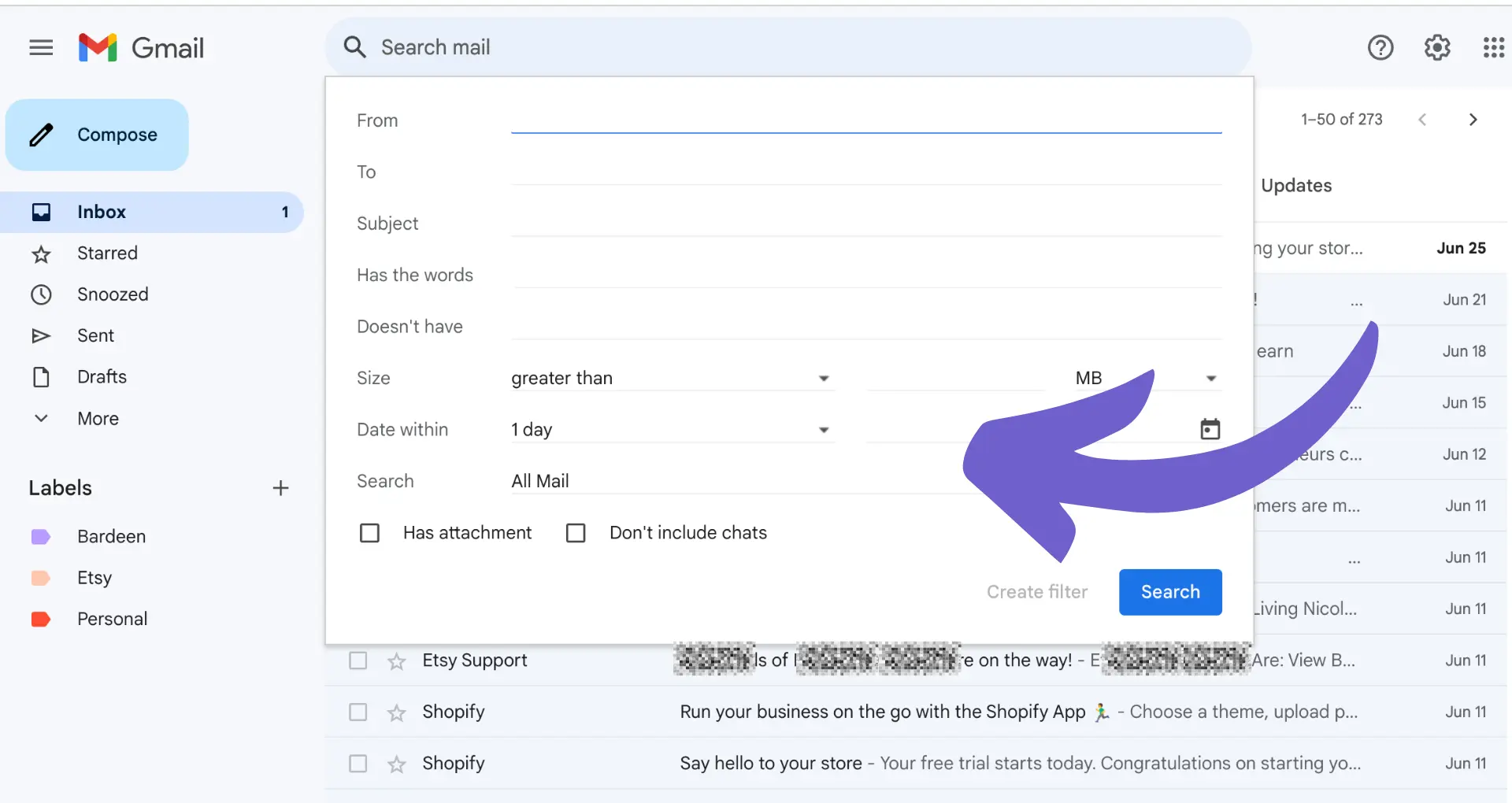





Did you know that 97% of people find local businesses online more than any other source? For businesses that operate locally, local lead generation is the most effective way to gain new customers.
That’s because local business lead generation targets potential customers in a specific area that you serve. Running national campaigns doesn’t make sense because you would be advertising to people who will never become customers.
So if you’re feeling the pain of not having enough leads right now, let me show you a better way. This guide will give you an introduction to local lead generation and show you how to improve your marketing using AI lead generation tools like Bardeen.
Local lead generation is a marketing strategy that involves finding and engaging with business leads in a specific geographic area. The goal is to advertise only to people who are in a location that the business serves.
Common tactics of local lead generation include:
Local lead generation is great for small and local businesses that rely on foot traffic. You can target search terms like “dentist in Nob Hill”, serve display ads to people in a specific city or zip code, or use Google Maps to identify leads nearby.. It also works for larger businesses with multiple locations, such as healthcare or childcare organizations.
With Bardeen, you can automate your local lead generation strategy using pre-built templates such as:



How does this playbook work?
Researching businesses on Google Maps is time-consuming. This playbook extracts data from search results, like business name and address, and automatically adds it to a Google Sheet.

How does this playbook work?
Saving Google Maps locations to Notion is a multi-step process. This playbook scrapes location data from a Google Maps card and creates a new linked Notion page with the information – in just one click.
Local lead generation strategies are different because they focus on location-based marketing tactics like local SEO and geotargeting. National lead generation strategies cast a wider net by targeting a broad audience with general messaging.
The table below illustrates some key differences between local lead generation vs national lead generation:
| Local lead generation | National lead generation | |
| Target audience | Local to a specific city or neighborhood | Anywhere in the country |
| Personalization | Highly personalized with local messaging and localized keywords | More generalized with universal messaging and broad search terms |
| Competition | Less competition but more importance on local reputation. | More competition with national and local brands. |
| Budget & cost | Lower cost because of the smaller audience | Higher cost because of the broad audience |
| Conversion rates | Higher conversion rates | Lower conversion rates |
| Marketing channels | Local SEO, local listings, local events | National SEO, influencer marketing, national ads. |
| Lead quality | Local searches have higher intent | National searches have lower intent |
Local lead generation is a good fit for businesses that rely on foot traffic or are otherwise limited by physical location. For example: restaurants, retail, landscaping, real estate, home improvement, healthcare, and childcare.
National lead generation is better suited for businesses that operate nationally (such as big box retailers and franchises), or businesses that are not limited by location (such as ecommerce or SaaS).
Learn more about sales prospecting automation to effectively reach and engage with both local and national prospects.
Lead generation is an essential part of every revops, marketing and sales engine. Think of it this way: businesses need revenue and you need leads to generate revenue. Therefore, you need some kind of lead generation strategy if you want to sustain or grow your business.
Local lead generation can contribute significantly to a business's revenue, with some studies indicating it can drive up to 50% of total revenue. And in B2B scenarios, a large portion (around 27%) of local leads are already considered sales-ready.
Local business lead generation is important because it helps you be more targeted with your marketing and avoid wasting money on leads that are not in your target demographic. For small or local businesses, running a national lead generation strategy won’t produce the results you need. It is best to niche down and focus on engaging with your local community.
Remember, with Bardeen, you can automate lead generation and spend more time building relationships that matter.
Now that you know the basics of lead generation for local businesses, I want to show you some great tactics and strategies you can use. Remember, you want to be as specific and targeted as possible. The goal here is to keep your pipeline full of the right type of leads - and don’t hesitate to use data enrichment to get the full picture about them
Here’s how you can do that:
You probably know how important it is to optimize your website for Google searches. But when it comes to lead generation for local businesses, the goal is to appear frequently in local searches. That means targeting terms like “pediatricians in San Mateo” or “dentist near me.”
Local SEO is super important because around 98% of consumers search online for local business information. And of those searches, about 80% lead to conversions.
So how can you optimize your business for local searches?
Once you’ve done all this, it’s just a matter of keeping your site updated with fresh content and making adjustments as search habits evolve.
Social media platforms like LinkedIn, Facebook, Instagram, and TikTok provide excellent opportunities to engage with potential customers in your local community. In fact, approximately 60% of consumers discover new businesses through social media. It’s also true that around 91% of local searches happen on Facebook.
So here’s what you can do to connect with your customers on social media:
Once you’ve got your strategy nailed down and you’re getting more leads than you know what to do with, use automation tools like Bardeen to engage with potential customers more efficiently:

How does this playbook work?
Need to quickly pull data from a LinkedIn profile? This playbook scrapes key information from the active LinkedIn profile tab, giving you structured data in seconds.

How does this playbook work?
Gathering data from Facebook profiles is time-consuming. With one click, this playbook extracts key information from a Facebook profile page, giving you structured data for research and analysis.

How does this playbook work?
Tracking Instagram followers and following is time-consuming. This playbook scrapes follower/following data from an Instagram profile and saves it to Google Sheets in one click, making it easy to analyze your audience.
When advertising to a local audience, know that you are going against other local businesses. That means local reputation is super important so you need to build some goodwill within your community.
Here are some things you can try:
For example, a local real estate agent could sponsor a neighborhood block party or host a first-time homebuyer seminar to connect with potential clients and boost your reputation in the community.
Targeted online advertising allows you to reach potential customers in your local area who are most likely to be interested in your products or services. Platforms like Google ads and Facebook lead ads offer robust targeting options, including geographic location, demographics, and interests.
Similar to local SEO, this is all about reaching only the customers in your community. For example, a local pet store could create a Google ads campaign targeting pet owners within a specific city or zip code, using keywords related to pet supplies and services. This type of approach can get you about 20% more clicks than non-targeted ads campaigns.
But on top of being more effective, local ads are also less competitive which makes them more affordable. In fact, the average cost per click (CPC) for local ads can be as low as $0.54 while the average CPC for national campaigns is closer to $0.77.
Local lead gen campaigns are not set and forget it. You want to continuously monitor performance, use lead generation software to scale, and find ways to improve performance. If you skip this part, you could end up wasting money or letting good leads slip through the cracks.
These tips will help you optimize your campaigns for better performance:
First things first, you need to define what success looks like. When you’re just getting started, success could be as simple as more website visits or more social media followers.
But as time goes on, you’ll want to set more specific goals such as “lower my customer acquisition cost by 10%” or “increase phone calls by 25% in the next quarter.”
Establishing clear, achievable goals is crucial for measuring the success of your local lead gen efforts. Consider factors like your industry, target audience, and historical performance data when setting these targets.
Next, you’ll want to identify which metrics to keep track of and set benchmarks to review your progress.
From there, you can set some metrics, or key performance indicators (KPIs), to gauge how well your ads are performing. Some common KPIs to consider include:
Keeping track of these metrics will tell you how well your lead generation campaigns are going and if you need to make changes. For example, you may decide to test new ad copy or social media content if things aren’t trending in the right direction.
A/B testing involves creating two versions of a landing page or ad copy and comparing their performance to determine which one resonates better with your target audience. By continuously testing and optimizing these elements, you can improve your conversion rates and generate more qualified leads.
For example, a local restaurant could create two versions of a Facebook ad promoting a new menu item, each with different images and copy. By monitoring the click-through rates and conversions for each ad, they can determine which one performs better and use those insights to inform future ad campaigns.
Consistently monitoring and analyzing your local lead gen data allows you to identify trends, pinpoint areas for improvement, and make informed decisions about your strategies.
Use tools like Google Analytics to track website traffic and user behavior, and consider investing in a customer relationship management (CRM) system to manage and analyze your leads.
A local real estate agency, for example, might notice that their social posts about a certain neighborhood generate a high number of leads. Based on this data, they could focus on creating more content tailored to this audience segment to drive even more qualified leads.
By tracking key metrics, setting realistic goals, testing and optimizing your campaigns, and regularly analyzing your data, you can continuously improve your local lead gen efforts and drive more qualified leads for your business.
Up next, we'll explore how to overcome common challenges in local lead gen.
Local lead generation can solve a lot of marketing problems for businesses. But that doesn’t mean there aren’t challenges to navigate. Obstacles such as local competition, limited budget, and a lack of brand awareness can hold you back.
But by addressing these challenges head-on and implementing effective solutions, you can find success with lead generation for local businesses.
In a crowded local market, it's crucial to differentiate your business from competitors. Focus on highlighting your unique selling points, such as exceptional customer service, high-quality products, or specialized expertise.
Take Cafe Juayua, for example. From the outside, they may look like just another coffee shop. But their marketing is full of rich stories about the origin of their coffee beans, their commitment to sustainability, and the history of the family. This kind of storytelling sets them apart from the thousands of other coffee shops in Los Angeles.
Developing a strong brand identity that resonates with your target audience will help you stand out in a competitive local market..
Small businesses often face the challenge of generating leads with a limited marketing budget. To maximize your resources, focus on cost-effective strategies such as:
You don’t need a huge budget to start your marketing engine. Engaging in these tactics will help you build a reputation and generate leads for local businesses without burning through all your cash.
When expanding into a new local market, building brand awareness is essential for generating leads. Engage with the local community by participating in events, sponsoring local organizations, and collaborating with other businesses. Utilize targeted advertising on platforms to reach your ideal customers and increase visibility.
A new fitness studio in town could offer free classes or partner with local health food stores to introduce their brand to the community and generate interest among potential clients.
Negative reviews and reputation management issues can significantly impact local lead gen efforts.
Proactively monitor online reviews and address any concerns promptly and professionally. Encourage satisfied customers to leave positive reviews to counterbalance any negative feedback. Develop a crisis communication plan to handle potential reputation management issues effectively.
For example, a local restaurant that receives a negative review about slow service could respond by apologizing, explaining the steps they're taking to improve, and offering the customer a complimentary meal to make amends and demonstrate their commitment to customer satisfaction.
By tackling these common challenges with targeted strategies and a proactive approach, you can effectively generate leads for local business and thrive in your community.
Remember, consistency and persistence are key to overcoming obstacles and achieving long-term success in local business lead generation.
I’ve covered what TO do, so now I’ll cover what NOT to do. Here are some common mistakes businesses make with local lead generation:
Local lead generation is about being as specific as possible. You can’t just run generic ads to a local audience and expect results. When you tailor your audience, website, and marketing campaigns to specific audiences, that’s when the magic happens.
Understanding local lead generation is crucial for small businesses looking to attract and convert customers in their specific geographic area.
In this comprehensive guide, you discovered:
By mastering local lead generation, you'll be well-equipped to grow your business and connect with your ideal customers. Don't miss out on the opportunity to become a local lead gen expert—your competitors certainly won't!










SOC 2 Type II, GDPR and CASA Tier 2 and 3 certified — so you can automate with confidence at any scale.
Bardeen is an automation and workflow platform designed to help GTM teams eliminate manual tasks and streamline processes. It connects and integrates with your favorite tools, enabling you to automate repetitive workflows, manage data across systems, and enhance collaboration.
Bardeen acts as a bridge to enhance and automate workflows. It can reduce your reliance on tools focused on data entry and CRM updating, lead generation and outreach, reporting and analytics, and communication and follow-ups.
Bardeen is ideal for GTM teams across various roles including Sales (SDRs, AEs), Customer Success (CSMs), Revenue Operations, Sales Engineering, and Sales Leadership.
Bardeen integrates broadly with CRMs, communication platforms, lead generation tools, project and task management tools, and customer success tools. These integrations connect workflows and ensure data flows smoothly across systems.
Bardeen supports a wide variety of use cases across different teams, such as:
Sales: Automating lead discovery, enrichment and outreach sequences. Tracking account activity and nurturing target accounts.
Customer Success: Preparing for customer meetings, analyzing engagement metrics, and managing renewals.
Revenue Operations: Monitoring lead status, ensuring data accuracy, and generating detailed activity summaries.
Sales Leadership: Creating competitive analysis reports, monitoring pipeline health, and generating daily/weekly team performance summaries.